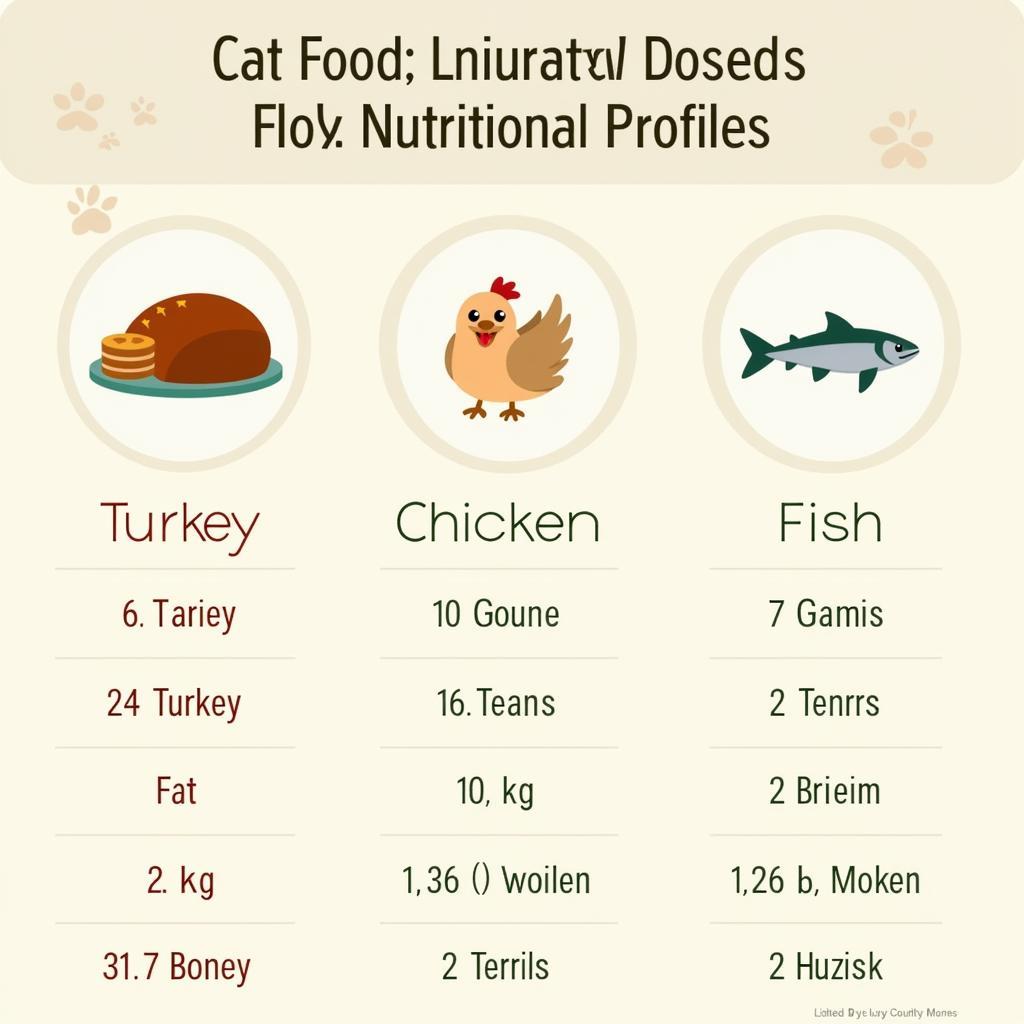Turkey Cat Food is a popular choice for pet owners looking for a lean protein source that’s often easily digestible. But with so many options available, from wellness turkey cat food to various pate recipes, navigating the world of turkey-based feline cuisine can be overwhelming. This guide will help you understand the benefits of turkey, what to look for in a quality cat food, and how to choose the purrfect meal for your furry companion.
The Benefits of Turkey for Cats
Turkey offers several nutritional advantages for cats. It’s a good source of lean protein, which is essential for muscle development and overall health. It’s also relatively low in fat, making it a good choice for cats prone to weight gain or with sensitive stomachs. Additionally, turkey is a good source of essential amino acids, such as tryptophan, which can contribute to a cat’s overall well-being. For cats with allergies to common protein sources like chicken or beef, turkey can be a great alternative.
Decoding the Cat Food Label
Understanding cat food labels is crucial for choosing the best option for your pet. Look for “turkey” listed as the first ingredient, indicating it’s the primary protein source. Pay attention to the guaranteed analysis, which outlines the minimum percentages of protein, fat, and fiber. Avoid foods with excessive fillers like corn, wheat, or soy, which provide little nutritional value. Instead, look for turkey canned cat food options that prioritize whole ingredients and balanced nutrition. The term “complete and balanced” signifies that the food meets the nutritional requirements established by the Association of American Feed Control Officials (AAFCO).
Choosing the Right Type of Turkey Cat Food
Turkey cat food comes in various forms, including dry kibble, wet food, and pate. Turkey pate cat food is a particularly palatable option for picky eaters or cats with dental issues, as its smooth texture is easy to consume. Dry kibble can help maintain dental health through its abrasive action, while wet food, like turkey wet cat food, provides hydration and can be more appealing to some cats. Ultimately, the best type depends on your cat’s individual preferences and needs.
Is Turkey Cat Food Right for My Kitten?
Kittens have specific nutritional requirements for growth and development. Look for kitten-specific formulas that are higher in protein and calories. Turkey can be an excellent protein source for kittens, but ensure the food is formulated to meet their unique needs.
Why Choose Turkey Over Other Protein Sources?
While chicken and fish are common cat food ingredients, turkey offers a distinct advantage for some cats. Its novel protein status can make it a suitable option for cats with food sensitivities. Turkey is also less likely to trigger allergies compared to more common protein sources.
 Turkey vs Other Proteins in Cat Food
Turkey vs Other Proteins in Cat Food
Dr. Emily Carter, a veterinary nutritionist, notes, “Turkey is a highly digestible protein source that can be beneficial for cats with sensitive digestive systems.” She adds, “Its lower fat content can also contribute to weight management in cats prone to obesity.”
Another expert, Dr. Michael Davis, DVM, recommends, “When switching your cat to turkey cat food, do so gradually to avoid digestive upset.” He suggests mixing a small amount of the new food with the old food and gradually increasing the proportion of the new food over several days.
In conclusion, turkey cat food provides a nutritious and palatable option for many cats. By understanding the benefits of turkey and carefully reading labels, you can choose the canned cat food turkey option that best supports your feline friend’s health and happiness.
FAQ
-
Is turkey a good protein source for cats? Yes, turkey is a lean and easily digestible protein source that’s suitable for many cats.
-
What should I look for on a turkey cat food label? Look for “turkey” listed as the first ingredient, a guaranteed analysis with appropriate protein and fat levels, and the AAFCO statement of nutritional adequacy.
-
Can kittens eat turkey cat food? Yes, but ensure it’s a kitten-specific formula to meet their higher nutritional needs.
-
How do I switch my cat to turkey cat food? Gradually introduce the new food by mixing it with their current food over several days.
-
Is turkey cat food good for cats with allergies? Yes, turkey is a novel protein that may be less likely to trigger allergic reactions in some cats.
-
What are the different types of turkey cat food available? Turkey cat food is available in dry kibble, wet food, and pate.
-
What are the benefits of wet turkey cat food? Wet turkey cat food provides added hydration and can be more appealing to picky eaters.
We understand that each cat is unique with individual needs. Here are a few additional questions that could be of interest:
- Is a grain-free turkey cat food better for my cat?
- How much turkey cat food should I feed my cat per day?
- Are there any specific brands of turkey cat food you recommend?
For further information on cat nutrition and wellness, we encourage you to explore other relevant articles on our website.
If you have any questions or need assistance, please contact us. Phone: 02437655121, Email: minacones@gmail.com or visit our address: 3PGH+8R9, ĐT70A, thôn Trung, Bắc Từ Liêm, Hà Nội, Việt Nam. We have a 24/7 customer service team ready to help.